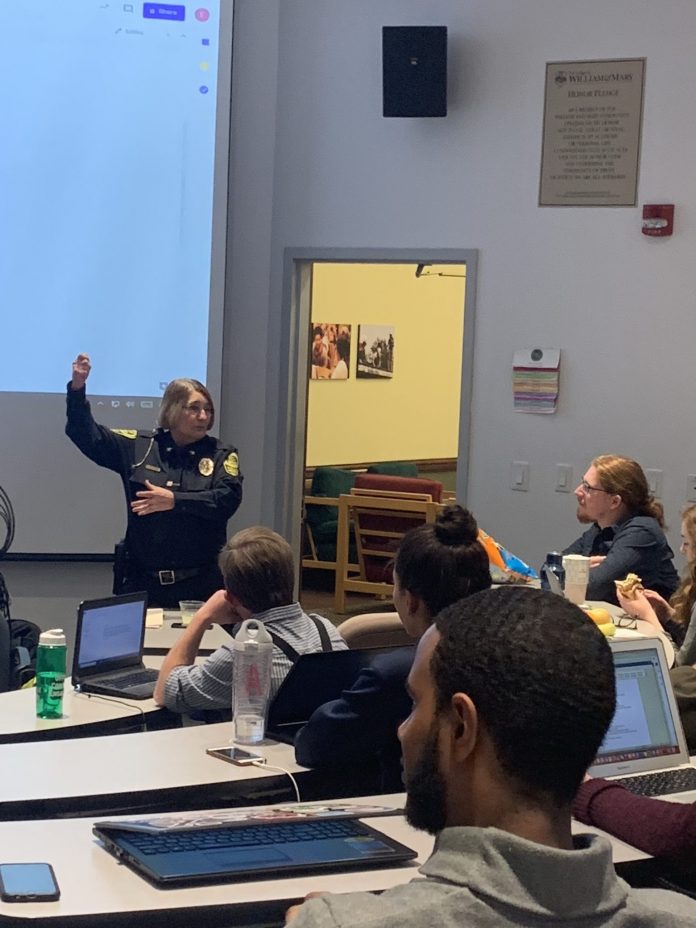At the College of William and Mary’s Student Assembly weekly meeting March 19, senators debated the potential passage of The Rapid Flashing Beacon Act, which seeks to improve campus safety by placing two rapid flashing beacons: one at the crosswalk outside Campus Center and another at the crosswalk bordering Sorority Court. In total, the two proposed beacons would cost $24,000.
Debate centered around whether SA should be responsible for allocating funding towards campus safety, or if doing so would set a dangerous precedent for SA tackling issues that would be better addressed by the College’s administration.
Many senators were concerned that the administration had failed to follow up with a formal memo guaranteeing their maintenance of the beacons once SA passes funding for their initial construction.
Class of 2022 President Suhas Suddala ’22 agreed that the College should issue some form of official statement in concurrence with the act. However, Suddala also argued that the act should not be tabled — or even opposed— because student safety demands immediate action.
“Even though in an ideal setting, we shouldn’t have to be the ones who pay for it, I think it’s important enough and the circumstances are at an impasse where we can’t come up with a quick solution, especially because it’s a very important problem on campus,” Suddala said. “I think we should take initiative and I’m basically saying I support this bill.”
Sen. Margaret Lister ’21, a cosponsor of the act alongside Sen. Jack Bowden ’19, also argued that the bill was a collaborative effort between SA, the administration, WMPD and the city of Williamsburg as an attempt to foster dialogue on student safety.
Lister said that the act’s collaborative nature ensures that SA will be able to maintain a line of communication with these groups, and hold them accountable for these types of issues in the future. She also added that the city would play an integral role in the installation process by putting down power lines and placing solar panels.
“At the end of the day, I would rather see it get done than have nothing happen,” Lister said. “I think of the money that we drop on events and speakers that are either one-night events, or, frankly, don’t have great attendance. From the student activities, this isn’t ideal, but it is something that has a tangible impact on students and something that students care about.”
Earlier in the meeting, Review Board Chair Henry Blackburn ’20 and Review Board member Anna Boustany ’21 gave a presentation about the state of the recently revived Review Board, which serves as SA’s judicial branch. The Review Board became operational once more last September, and has spent the past two semesters developing the most efficient framework for carrying out its duties. Some of Review Board’s duties include how to interpret the constitution and code, when to hear appeals and how to oversee impeachment processes.
Appointments for the open spots on the Review Board will be made in mid-April following an application and recommendation process.
Sen. Hailey Guerra J.D. ’19 then introduced the Constitutional Omnibus Amendment of 2019, which is also sponsored by Bowden and Sen. Anthony Joseph ’21. The resolution outlines grammar and pronoun changes to the current SA Constitution but also enforces substantial changes, all of which serve to bring the constitution in line with SA’s practical operation.
“This brings the constitution in line with how you guys practice now,” Blackburn said.
Guerra, Bowden and Joseph also introduced the Investing in Justice Act. This bill calls for the creation of two new positions: the Attorney General and the Chief Counsel. The Attorney General, who would be nominated by the President and confirmed by the Senate, would act as the chief legal counsel for SA. The Chief Counsel, an appointment by the Chair of the Review Board, would be a non-SA member who represents the student body in the judicial branch.
“This is essentially creating roles that can serve to provide some oversight and hopefully two positions that can kind of become experts on our constitution and code,” Guerra said.
Also at this week’s meeting:
- The Senate passed the Dairy Vehicular Part V Act, which allocates $2,000 for an ice cream truck which will provide free ice cream to prospective students April 13, Day for Admitted Students.
- The Class of 2022 senators introduced the Hydrate or Dye-drate Act, which calls for a water-bottle decorating event in partnership with Take Back the Tap April 14.
Editor’s Note: The Flat Hat would like to clarify that Anna Boustany ’21 is an Opinions Editor for the paper. Her involvement with Student Assembly is not on behalf of the paper’s interests.

